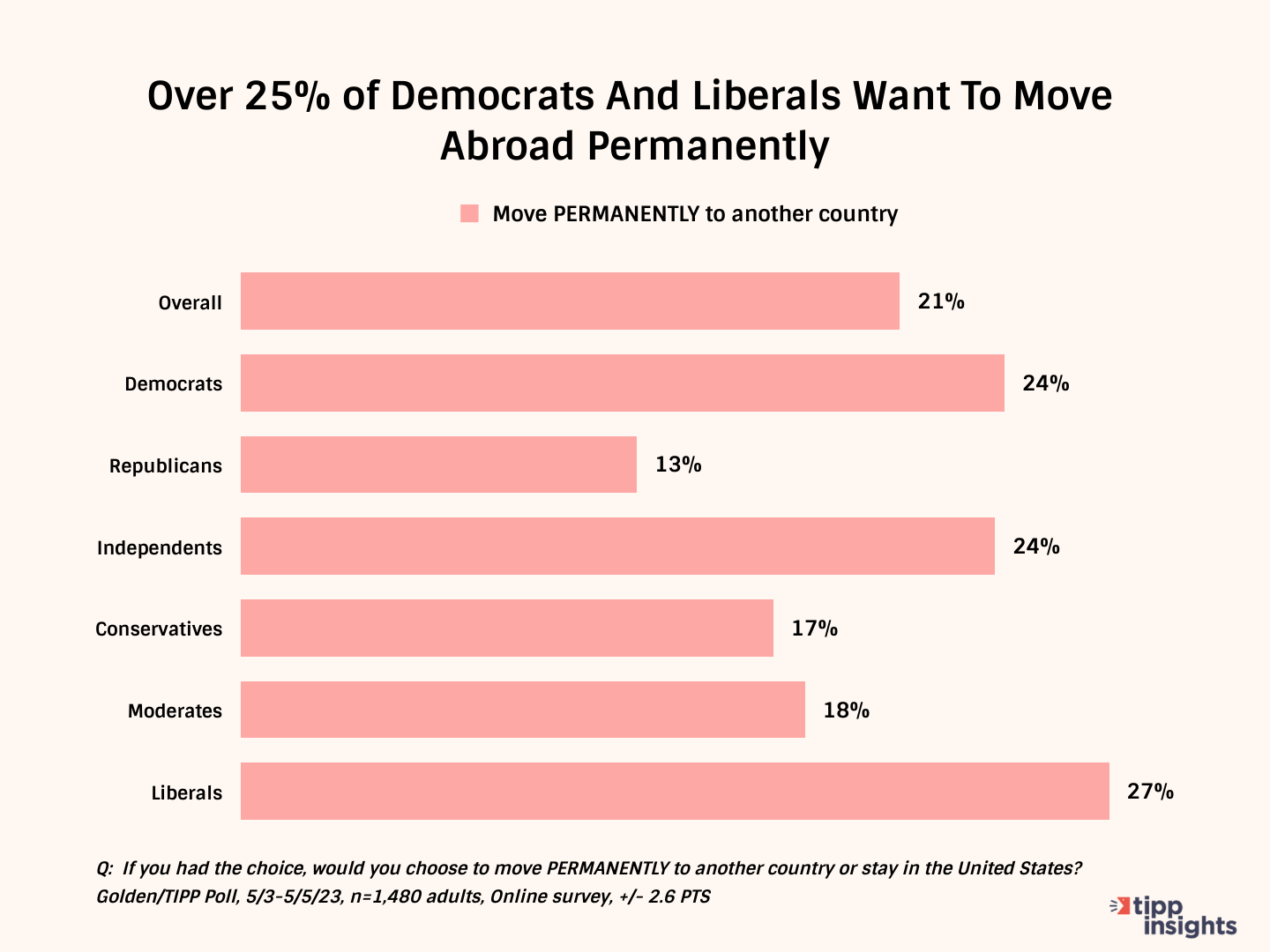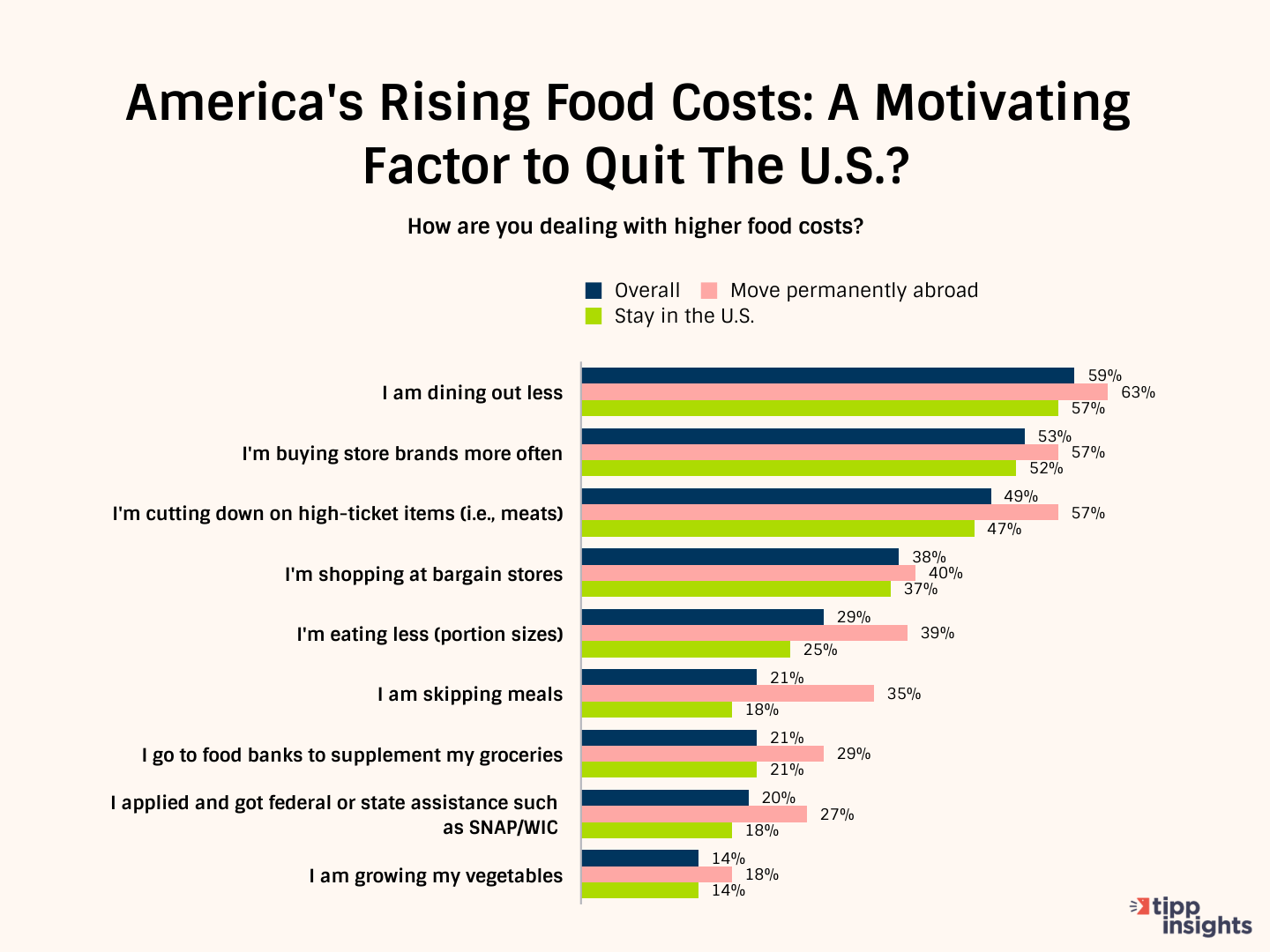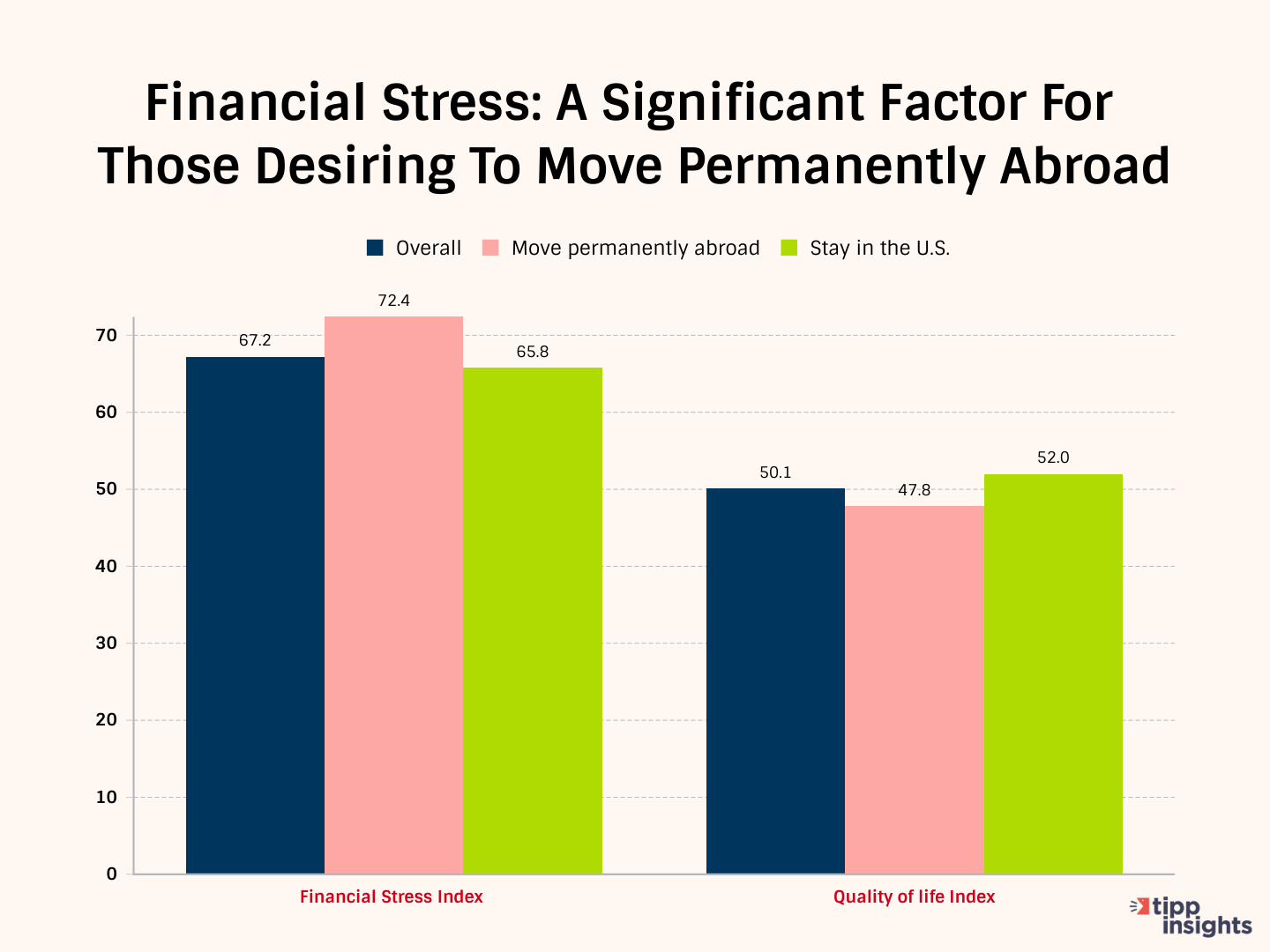Over one in five Americans express a strong desire to permanently move to another country if given the opportunity, according to a recent Golden/TIPP Poll of 1,480 Americans nationwide.
Financial considerations significantly drive this desire.
Young adults exhibit the strongest yearning. Interestingly, Democrats and liberals are more inclined to leave, while Republicans and conservatives hold a contrasting sentiment.
The online survey was conducted from May 3 to 5. The survey’s credibility interval (CI) is +/- 2.8 percentage points, meaning the study is accurate to within ± 2.8 percentage points, 19 times out of 20, had all Americans been surveyed.
The survey asked respondents: “If you had the choice, would you choose to move permanently to another country or stay in the United States?” The results read as follows:
- 21% move permanently to another country
- 66% stay in the United States
- 13% not sure

Who Wants To Quit?
The desire to leave the United States varies among political parties and ideologies.
Surprisingly, Democrats (24%) and liberals (27%) express a desire to leave Biden's America, while only 13% of Republicans and 17% of conservatives share the same sentiment.

Among the 36 demographic groups we analyzed, the 18-24 age group exhibits the highest desire to leave, with a staggering 36% expressing their willingness to do so if given the choice. Additionally, if given the opportunity, over a quarter (28%) of individuals in the 25-44 age group express their intention to quit.
It is worth noting that as age increases, the desire to leave diminishes, with only 8% of individuals in the age 65+ group expressing the wish.

What Is Driving The Desire?
In simple terms, financial considerations are the main driving force.
When comparing the two groups - those who want to leave and those who want to stay - across eight financial concerns, we consistently observe a significantly higher number of individuals wishing to quit expressing financial worries than those who want to remain.
Here are the differences across various financial aspects:
- Maintaining your current standard of living: 81% of those wanting to move abroad express concerns, compared to 67% of those wanting to stay in the U.S.
- Having enough savings for retirement: 78% of those wanting to move abroad have worries, while 64% of those wanting to stay in the U.S. share the same concern.
- Being able to pay medical or health care costs: 71% of those wanting to move abroad express this concern, in contrast to 58% of those wanting to stay in the U.S.
- Ability to pay utility bills: 66% of those wanting to move abroad worry about this, while 56% of those wanting to stay in the U.S. have similar concerns.
- Affording mortgage payments or rent: 64% of those wanting to move abroad express concerns, whereas 49% of those wanting to stay in the U.S. share this worry.
- Making on-time credit card payments: 56% of those wanting to move abroad express this concern, compared to 45% of those wanting to stay in the U.S.
- Making on-time auto loan/lease payments: 50% of those wanting to move abroad worry about this, while 36% of those wanting to stay in the U.S. have similar concerns.
- Financing children's education: 43% of those wanting to move abroad express concerns, in contrast to 33% of those wanting to stay in the U.S.

Inflation has had a greater impact on individuals who wish to move abroad than those who want to stay in the United States.
As Americans grapple with higher food costs, they employ different financial management strategies.
Echoing their financial concerns, a consistent pattern emerges, with a higher proportion of individuals wishing to leave opting for these strategies than those who want to stay.
For example, 35% of those wanting to leave are skipping meals, while only 18% of those who want to stay follow the same approach. Similarly, 39% of individuals intending to leave eat less, in contrast to 25% of those who wish to stay. Moreover, 27% of those seeking to depart have applied and received federal assistance such as SNAP/WIC, compared to 18% of those who desire to remain.

Job Sensitivity
We classify a household as job sensitive when at least one family member actively seeks full-time employment (job seekers) or if the family has concerns about potential layoffs within the next year (concerned).
Among American households, 54% exhibit job sensitivity. However, for those who want to move permanently abroad, this percentage increases to 70%. In contrast, the figure stands at only 50% for those who want to stay.
Similarly, 40% of U.S. households have a member actively seeking a full-time job. However, among those who want to move permanently abroad, this percentage increases to 55%, whereas it is only 36% for those who wish to stay.
Additionally, 35% of U.S. households express concerns about a member potentially losing their job within the next 12 months. However, among those desiring to move abroad permanently, this percentage increases to 51%, while it remains at only 32% for those who want to stay in the U.S.

Financial Stress
Our IBD/TIPP Financial Stress Index effectively captures the extent of financial struggles. This index measures financial stress on a scale from 0 to 100, with higher numbers indicating greater stress levels.
For individuals desiring to move permanently abroad, the Financial Stress Index stands at 72.4, which surpasses the overall index of 67.2. In comparison, those who wish to stay in the U.S. have a slightly lower index of 65.8.
Our Quality of Life Index is derived from the question, "In the next six months, do you anticipate that your quality of life will improve, worsen, or remain the same as it is now?" A higher index score reflects greater optimism regarding the quality of life.
Among individuals aspiring to relocate permanently abroad, the Quality of Life Index is 47.8, slightly lower than the overall index of 50.1. In contrast, those who wish to stay in the U.S. exhibit a slightly higher index of 52.0.

Conclusion
Over one in five Americans express a strong desire to permanently move to another country if given the opportunity, driven significantly by financial considerations. Young adults exhibit the highest yearning, while Democrats and liberals are more inclined to leave compared to Republicans and conservatives. This trend reflects disillusionment among young people, which is concerning considering they are the country’s future.
Like our insights? Show your support by becoming a paid subscriber!
Please email editor-tippinsights@technometrica.com






